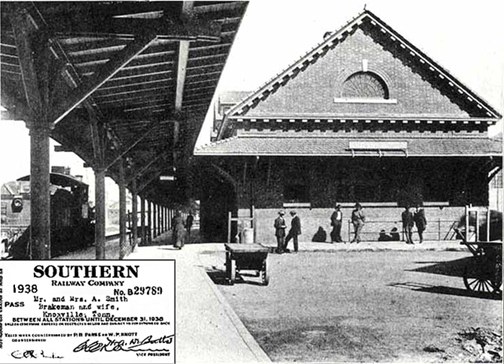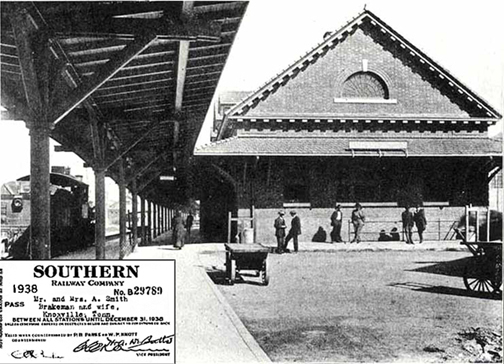In its heyday, Johnson City’s Southern Railway Depot was a scene of constant activity as travelers embarked and disembarked passenger trains.
Today’s column deals with a young lady, whom I will identify as Jane Doe. It is early summer of 1938 and she is anxiously waiting for the big locomotive to arrive to take her on an extended journey away from the city. Since she has never been on an overnight train trip before, she is understandably apprehensive.

It is imperative that she follows a few common sense rules of train etiquette while on board. First, she needs to dress fittingly for the long ride. Summer wear calls for her to adorn a silk or non-crushable linen suit and a lightweight woolen coat. Her hat should be small yet comfortably stay on her head. She needs to wear sturdy comfortable leather shoes. Her luggage should be sturdy enough so as not to come apart at some point during the lengthy jostling ride.
If at any time she needs a question answered, either at the station or on the train, she should consult a railroad employee not a fellow passenger, lest she be offered erroneous advice. Most trains have signs posted advising people not to play cards with strangers. That is not to say she should not participate in a friendly game of bridge or similar pastime, providing no wagers are involved.
When Jane enters the dining car, the steward will escort her to a table and offer her a menu card. Afterward, a waiter will take her order and deliver her food. After she finishes the meal, he will bring her check on a tray. She should place her money on it and wait until he returns with her change. If her bill is under a dollar, the appropriate tip is ten cents. If the meal totals more than a dollar, the suggested amount is 10 to 15 percent of the bill.
Pullman cars can present a formidable and awkward challenge to travelers. Jane can choose a lower berth or an upper one. Since she is young, she picks a higher one, which is slightly cheaper and often more comfortable, although more difficult to get in and out of. A small, agile person can fully dress in his or her berth, but others may find it difficult. Miss Doe should bring along a dark robe or appropriate gown to wear when going from her berth to the nearby dressing room. She needs a small bag containing brushes, combs, cosmetics and other toiletry items for use in the washroom.
Some folks prefer to dress entirely in the dressing room, which requires getting up early ahead of the morning rush. Passengers who chose lower berths are entitled to sit in the seat that faces forward. If the young traveler wants to retire early, she can request the porter to have her berth made ready. The lower occupant must move to an unoccupied nearby seat or go in the club car until this task is completed. When ready to turn in, she again notifies the porter to bring a ladder. In the morning, she uses a bell to signal the porter that she needs the steps again.
Another courteous suggestion is to ask for additional blankets before retiring. Train blankets are heavy but often provide little warmth. Ringing for a porter in the middle of the night is inconsiderate because it awakens other passengers plus the porter may not be available or on break. If Miss Doe wants her shoes shined, she places them on the floor under the lower berth. Payment for the shine can be included with the tip upon leaving the train.
Before Miss Doe reaches her final destination, her porter will brush her clothing, wipe off her shoes and carry her bags for her. This is the appropriate time to tip him. The amount should be 25 to 50 cents for each special service rendered such as a shoeshine or providing a card table. Bon voyage, young lady, we hope to see you back in Johnson City soon.
